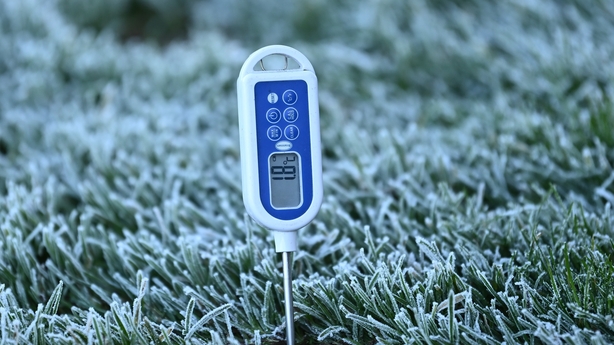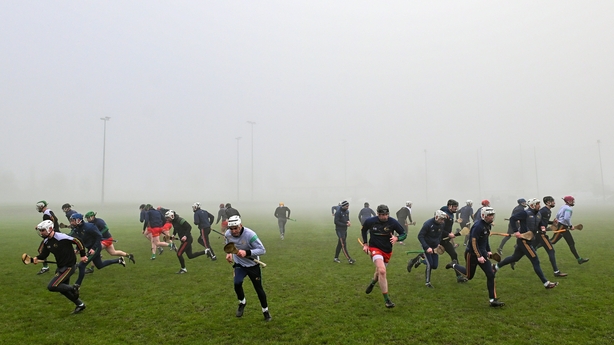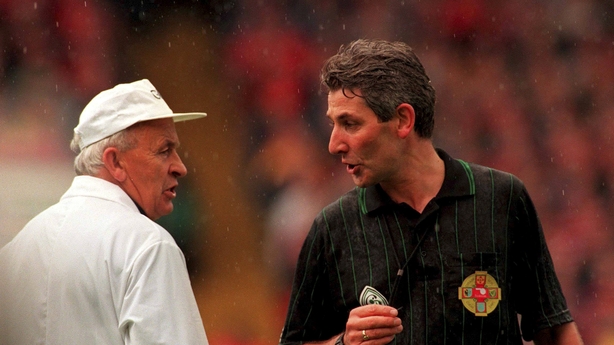As the ball was about to be thrown in by Conor Lane for Sunday's All-Ireland semi-final between Glen and Kilmacud Crokes at Páirc Esler, Dublin manager Dessie Farrell - baseball hat on as always - squeezed through the packed crowd on the terrace side and took up a position around the 45-metre line on the scoreboard end.
Farrell would have been eager to find out how some of his county contingent would perform in one of the most highly-anticipated club games of recent times, but there was one major problem – he could barely see Paul Mannion in the first half.
Doing his work mostly down in the far corner in front of the stand, Mannion was a ghost to the terrace side in that opening half hour. Indeed, when Mark O’Leary put the All-Ireland champions two points ahead in the fifth minute, many on that side hadn’t realised a score had been registered until the cheer from the stand informed them.
Páirc Esler was in fantastic shape thanks to the work of groundsman Paul Rafferty and his team, and the players deserve immense credit for producing a brilliant encounter. However, the game was played in near farcical circumstances with freezing fog drifting in from the town end throughout.
It was played though, and Glen edged out the Dublin side, securing an All-Ireland final date with Connacht champions St Brigid’s in the process.
Earlier in the day in Thurles, the Roscommon outfit had beaten Cork’s Castlehaven in another encounter that couldn’t escape conversation about whether it should have proceeded or not.
The TG4 cameras were there to capture the action and they beamed back images of a real Irish summer pitch – half covered in brilliant sunshine and half covered in a frost that lay on the turf throughout. Slippage was almost non existent, it must be added, with officials pointing out that the ground itself was not frozen.
Back up in Newry, Kilmacud boss Robbie Brennan described the decision to play their game as "a joke".
Glen defender Michael Warnock told RTÉ Sport that his direct opponent Shane Walsh had turned and asked him where the ball was at one stage.
The internet ran out of space to host the jokes about Kilmacud sneaking on a 16th player after last year’s shenanigans.
For many, it was a surprise that the game ploughed on with other fixtures, such as Cork’s Munster Hurling League clash with Limerick, Carlow's clash with Kilkenny and Westmeath’s meeting with Antrim in the Walsh Cup postponed. Galway were 13 points up on Offaly when their game was abandoned after 55 minutes.

The club action continued though, perhaps because the post-Christmas window has almost been pulled completely shut by Ard Chomhairle’s decision in 2019 to move finals from the traditional St Patrick’s Day slot to January.
With this year’s All-Ireland final pencilled in for 21 January at Croke Park, wiggle room for postponements was in short supply. If one, or both the games, had been hooked, then those sides were looking at a one-week run into possibly the biggest games of their lives.
The Allianz Football League also starts just six days after the final, meaning the club window for those fortunate enough to reach this stage is incredibly tight. New Derry manager Mickey Harte is expecting the Watty Graham's contingent to be there from the get-go - "I think they will be ready and raring to go," he said after the Oak Leaf County's McKenna Cup win over Cavan.
There really is little room for manoeuvering and former GAA President Sean Kelly feels that something has to give.
Kelly, who led the association between 2003 and 2006, and is currently an MEP for Ireland South, cited the impact on players, officials and supporters, arguing it warranted further analysis.
"I think there will have to be an analysis done, independently and objectively, on perhaps the unforeseen consequences.
"Especially for players. Putting huge pressure on them. No closed season, now. Many of them going 24/7, 12 months of the year."
National match officials manager Donal Smyth said that both Lane and David Coldrick, who took charge of St Brigid's and Castlehaven, would have had player safety very much at the forefront of their minds when deciding to green light the fixtures rather than any lack of space on the calendar.
"For the likes of Newry yesterday, player safety is the most important thing," he told RTÉ Sport.
"At ground level there was no issue with the game but high up in the stand you couldn’t see.
"If the referee thought it was going to be unsafe he would have made that phone call to say we have an issue here. The same in Thurles where half the ground looked to be covered in frost but it wasn’t actually, it was just the white of where the first had been."
It was a viewpoint strongly backed up by GAA director of communications Alan Milton.
"The final decision comes down to the match official and our primary concern for us as an organisation is the safety and well-being of our players and the match officials on the park," Milton told RTÉ Sport after the game in Newry.
"In this instance, we were very lucky we had a referee of the status and experience of Conor Lane who made the call and he was happy for it to proceed.
"And while it wasn't perfect for viewers at home, I think most of the people, an almost 9,000-strong crowd, enjoyed the spectacle for what it was."
For former national referees’ chief Mick Curley, Sunday’s clash in Newry brought back memories of another fog-dominant All-Ireland club fixture from all the way back in 1995.

That saw Ulster champions Mullaghbawn travelling to London to face British champions Tara. With freezing temperatures impacting England’s capital, the game was moved from Ruislip to Parnell Park further north with heavy fog drifting in during the game.
Former Armagh goalkeeper Benny Tierney said he couldn’t see past the halfway line at times, meaning he saw very little action as the visitors dominated.
When Mullaghbawn returned to the airport for their flight back to Belfast, a Tannoy announcement informed them that it had been cancelled. Celebrations followed with a night on the town in London now awaiting.
"The fact that there was white on the pitch for the St Brigid’s match doesn’t necessarily mean it was frozen underneath," Curley told RTÉ Sport. "The fog would be the greater problem.
"That game in London is the only time I can ever remember the fog being an issue for me and in that particular incident the pitch we played on was actually the third pitch we had sought out.
"I arrived the evening before and there was a [minus 6C] frost that night. When I went onto the Ruislip pitch it was as hard as the car park. I wasn’t putting the players out on that pitch, definitely not.
"An official knew of one or two pitches and we took off. We ruled the second pitch out and we went to the third one and it was playable. At the beginning of the match, the fog was not an issue, but as the game wore on, and especially in the last five minutes, from the middle of the field I could barely make out the goalposts at either end and I was depending very much on my umpires."
That example, according to Curley, is the reason why a standardised postponement system remains a difficult sell in the GAA.
Supporters’ frustrations become evident with a late deferment but Curley said that the idea of a guidance on a final decision being taken at a certain time period before throw-in is also flawed as the worsening conditions can often arrive after a game has started.

The former official, who refereed the 1999 All-Ireland final as Meath defeated Cork, said that he was never pressurised into playing a game even if conditions pointed to a postponement, and he also feels that if it had been hurling semi-finals on Sunday, the matches may have been called off - irregardless of the tight calendar.
"The fact that it was football was a big thing. If it was a hurling match it would be different."
"If the situation is dangerous, the referee has to be very mindful of that.
"Putting players out into a situation that could cause injury, every referee has to make a call on that on the day as they see fit.
"The fact that it was football was a big thing. If it was a hurling match it would be different.
"The Galway-Offaly hurling match was called off yesterday. I was listening to our local commentator on the radio, Niall Canavan [Galway Bay FM] and at one stage he had to go down to the sideline to see what was happening.
"The priority though has to be player safety, it simply has to be. Then again, until you go out onto the pitch and around the halfway line, you don’t really know until you see it.
"But regardless of what pressure is on you, player safety comes first."
Met Éireann has issued a yellow weather warning for Monday and Tuesday, parts of the north were covered in ice on Monday morning and another round of midweek inter-county games are on the horizon.
The GAA fan’s obsession with the weather is set to continue for a while yet.

